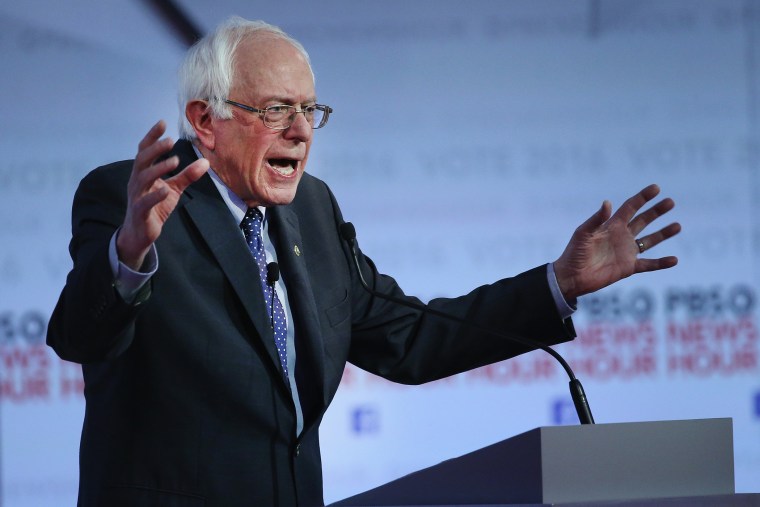Fairly early on in last night's Democratic debate, Bernie Sanders, responding to a question about the criminal justice system, made a vow that drew hearty applause from the Milwaukee audience.
"Here is a pledge I've made throughout this campaign, and it's really not a very radical pledge,"
Sanders said. "When we have more people in jail, disproportionately African American and Latino, than China does, a communist authoritarian society four times our size. Here's my promise, at the end of my first term as president we will not have more people in jail than any other country."
It's a sentiment that nearly all Democrats (and even many Republicans) would find compelling, but NYU's Mark Kleiman
highlighted a problem: it's a promise Sanders wouldn't be able to keep.
If we elide the distinction between prisons (holding people convicted of serious crimes) and jails (holding people convicted of minor crimes and people awaiting trial), it is true and important that the U.S. leads the world in incarceration. That's a disgrace. (I seem to recall having written a book on the topic.) We should do something about that, and there are things to do about it. A President can do some of them. But of the 2.3 million people behind bars in this country, fewer than 10% are Federal prisoners. The rest are in state prisons and local jails. If the President were to release all of the Federal prisoners, we would still, as a country, have more prisoners than any other country. So Sen. Sanders was very specifically making a promise he has no way of keeping. Either he knows that or he does not.
There's no doubt that Sanders' pledge is well intentioned, but in a case like this, the details get in the way.
All of which reinforces an important difference between Sanders and Hillary Clinton: the former thinks big and bold, without too much concern for realism or practical limits, while the latter is almost preoccupied with not over-promising.
Mother Jones' Kevin Drum had
a funny piece on this dynamic overnight, noting Sanders' grand plans -- single-payer health care, free college, an overhauled justice system, etc. -- to which Clinton recommends caution and step-by-step progress.
[T]his is the bind Hillary Clinton is in. Bernie Sanders delivers all these big, stemwinding proposals and doesn't really have to explain how he's going to pass any of them or get them paid for. But he sure is visionary! Hillary, conversely, is just constitutionally incapable of talking like this. When a problem is raised, her mind instantly starts thinking about what works and who will vote for it and where the payfors are going to come from. And that means she sounds like an old fuddy duddy patiently explaining why your bright idea won't work. No wonder young voters don't care much for her.
For all the talk about Clinton's embrace of President Obama -- and Sanders' belief that the president hasn't gone far enough -- it's the Vermont senator who's adopted Candidate Obama's unbridled optimism about what's possible. No matter the issue, Sanders doesn't want to talk about what's realistic; he wants to tell his supporters, "Yes we can!"
Clinton's response, in effect, is, "Well, maybe! If we recognize institutional and fiscal limits! And work with stakeholders in a deliberate way! And accept the fact that federal policymaking is incredibly difficult and we won't get everything we want all at once!"
Idealism vs. realism in a nutshell.
